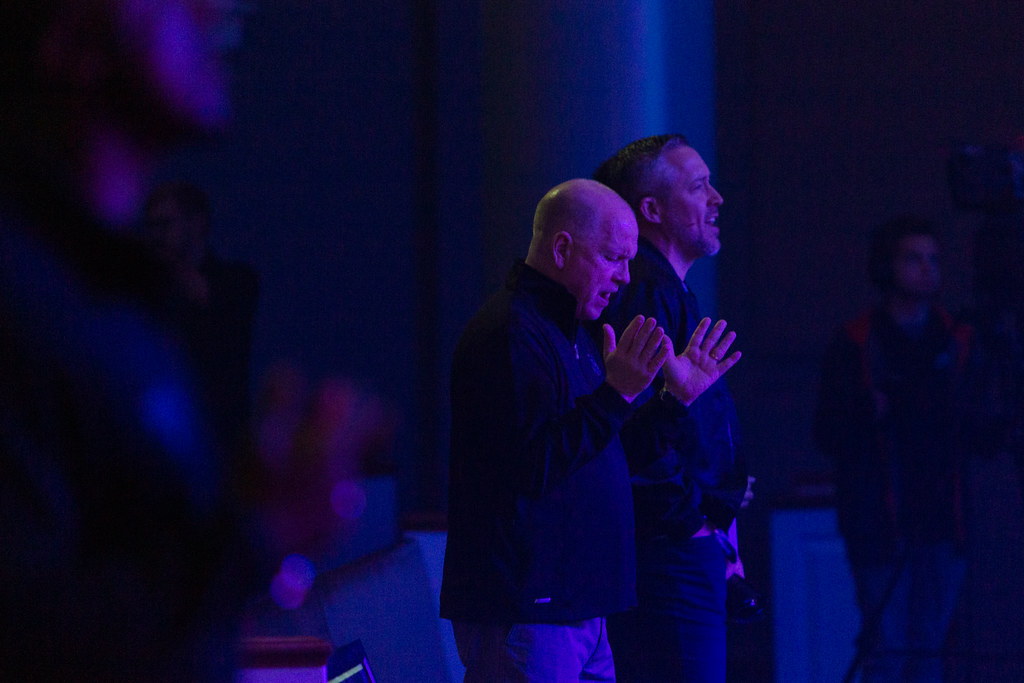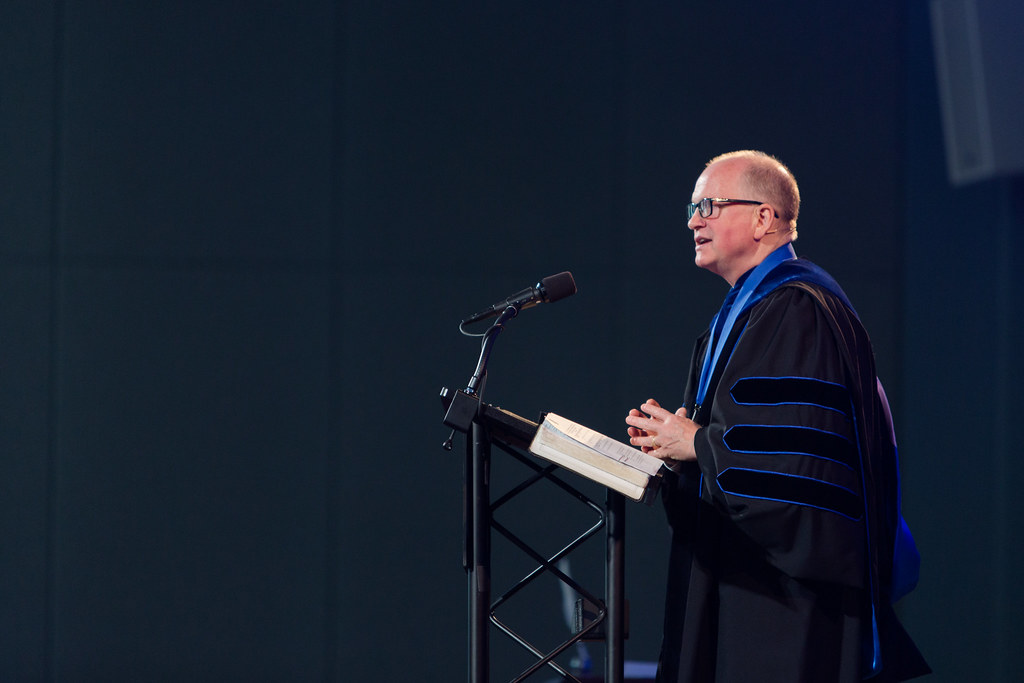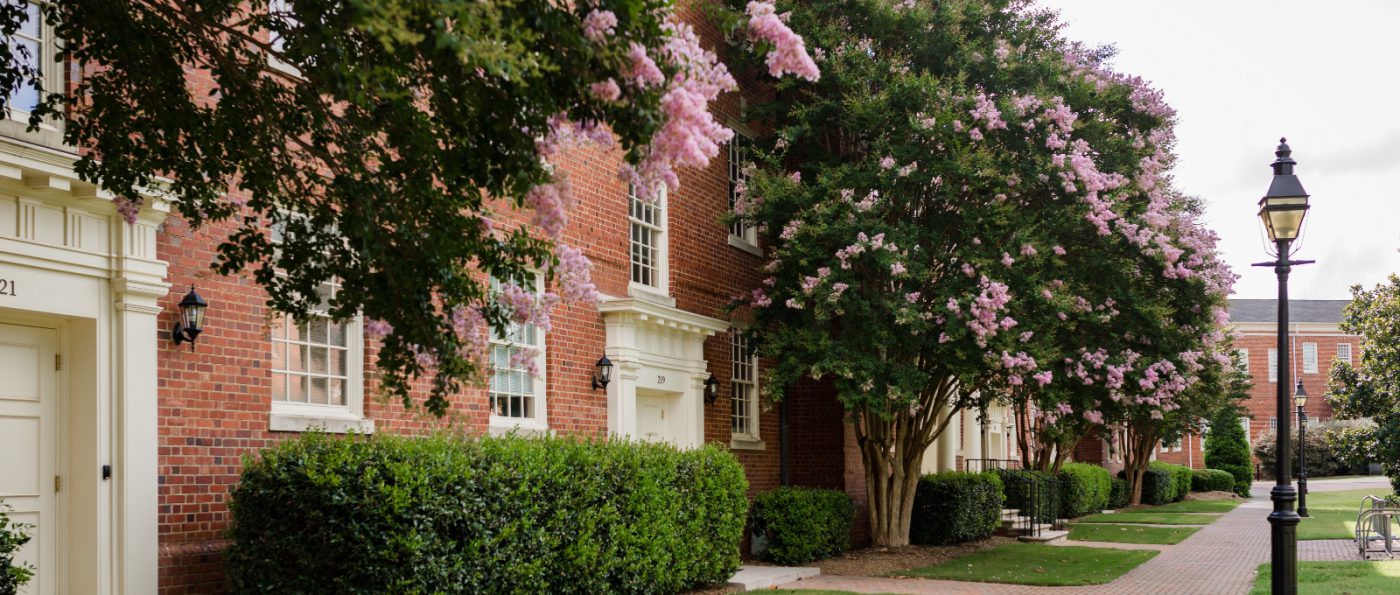Southeastern is a Great Commission seminary where learning occurs in light of God’s glory and God’s mission. The mission of God issues from the Creator’s desire to share his life and love with his creation, and to form a people for himself who proclaim his glory and enjoy the pleasures of life with God forever. Southeastern’s institutional mission is focused on God’s mission in the world and is situated in the context of a particular identity and particular confessional commitments.
Mission
Southeastern Baptist Theological Seminary seeks to glorify the Lord Jesus Christ by equipping students to serve the church and fulfill the Great Commission (Matthew 28:19-20).
Identity
Southeastern Baptist Theological Seminary is an institution of higher learning and a Cooperative Program ministry of the Southern Baptist Convention.
Confession
Southeastern Baptist Theological Seminary affirms the Bible as the authoritative Word of God. We covenant to teach in accordance with and not contrary to the Abstract of Principles and the Baptist Faith and Message . We further affirm the Chicago Statement on Biblical Inerrancy and Danvers Statement on Biblical Manhood and Womanhood.
Core Competencies
To equip students to serve the church and fulfill the Great Commission, the Southeastern Faculty builds curricula and courses, drawing upon the great tradition of Christian orthodoxy and our Baptist heritage, to develop the following core competencies so that Southeastern graduates:
Spiritual Formation
Demonstrate the knowledge and skills necessary to pursue an authentically Christian way of life, manifested by trust in God, obedience to Christ’s commands, love of God and neighbor, and committed to the global mission.
Biblical Exposition
Demonstrate the ability to properly and effectively interpret, apply, and communicate the Scriptures.
Theological Integration
Demonstrate the ability to understand and apply the doctrines of Christianity to life and ministry.
Ministry Preparation
Demonstrate the knowledge, skills, and Christian disposition necessary for ministry and leadership in the church and among the nations. 
Critical Thinking and Communication
Demonstrate the ability to think critically, argue persuasively, and communicate clearly.
Articles of Faith
The Bible is the Word of God written, and alone is inspired and authoritative for faith and practice. Baptists have often formed confessions of faith to affirm the central teachings of Scripture. Two articles of faith are affirmed by the Board of Trustees and faculty at Southeastern. The Abstract of Principles is the oldest doctrinal confession approved by Southern Baptists. It was composed by Basil Manly, Jr., in 1858. The Baptist Faith and Message , revised in 2000, is the most recent confession adopted by the Southern Baptist Convention.
Since Southeastern’s founding in 1950, each elected member of the faculty has publicly signed the Abstract of Principles at the beginning of his or her teaching career at the Seminary. Currently, Southeastern’s faculty members also publicly sign and affirm the Baptist Faith and Message as adopted by the Southern Baptist Convention in 2000. In addition to these two articles of faith, the trustees and faculty affirm the Chicago Statements on Biblical Inerrancy and Hermeneutics and the Danvers Statement as doctrinal guidelines for the institution.
Affirmed Statements
In addition to our articles of faith, Southeastern further subscribes to other documents that clarify our beliefs on critical issues of our day. The Chicago Statement on Biblical Inerrancy reflects Southeastern’s commitment to biblical authority. The Danvers Statement addresses the issue of biblical manhood and womanhood. One Faith, One Trust, One Sacred Task is an expression of commitment to the churches of the Southern Baptist Convention on the part of the six Southern Baptist Seminaries, which includes Southeastern.
Southeastern’s History
Southeastern Baptist Theological Seminary was formed on May 19, 1950, by a vote of the Southern Baptist Convention meeting in Chicago. Trustees elected by the Convention secured a charter and adopted the Abstract of Principles as the Seminary’s Articles of Faith. Southeastern began classes in the fall of 1951 on the campus of Wake Forest College in Wake Forest, NC, a campus recognized then and now as one of the most beautiful in the southeastern United States. The campus itself has a Baptist heritage. In 1832, the Baptists of North Carolina purchased the 615-acre plantation of Dr. Calvin Jones for the purpose of establishing a teaching facility for young ministers. From 1951 to 1956, the current Appleby Hall housed the new Seminary. In 1956, when Wake Forest College moved to its new location in Winston-Salem, NC, Southeastern occupied the rest of the Wake Forest campus.
The Wake Forest Baptist Church was organized in 1835, and occupies the church building (1913) within the campus enclosure. Another historic landmark, the stone wall now surrounding the central campus, was begun about 1885 by Wake Forest College President Charles E. Taylor and “Dr. Tom” Jeffries. The wall was rebuilt by Doug Buttram, a Southeastern graduate, during 1990-1994.
Southeastern’s campus is noted for its splendid natural beauty as well as its graceful classic Georgian architecture. The grounds are rich with magnolias, elms, pines, oaks, cedars, firs, maples, and other varieties of flowering fruit trees. Many of the trees were growing on the land even before the plantation was built and are centuries old. Several massive white oaks, once part of a magnificent grove called Wake Forest (for which the town was named) still stand on the Southeastern campus.
Through the years, Southeastern has complemented the natural setting with dogwoods, hollies, and an array of flowers. The buildings of the original Wake Forest College have been renovated, and new buildings have been added. With each change, the goal has been to maintain the character of the original campus and land. Today, Southeastern’s campus comprises a full range of excellent facilities for living and learning.
Akin Presidency, 2004-present

In January 2004, Trustees elected Daniel L. Akin as Southeastern’s sixth president. Akin’s leadership has brought many innovations while at the same time providing a sense of continuity for Southeastern’s theological identity. He has renewed the emphasis on expository preaching in masters and doctoral studies, and he leads the seminary in a Great Commission focus.
In 2004, Southeastern added an Internet-based distance learning program, and a non-thesis version of the Th.M. In 2005-2006, the Faculty significantly revised the degree program structure on both the undergraduate and graduate levels. Dr. Akin established a new administrative structure and opened the L. Russ Bush Center for Faith and Culture, now located in Patterson Hall. The Bush Center for Faith and Culture is named for Dr. Russ Bush, who served as Southeastern’s academic dean under both Drummond and Patterson. In October 2006, the Prince Building for facilities management was dedicated.
In 2006, Southeastern launched the Doctor of Education program under the guidance and leadership of Dr. Akin and Dr. Kenneth S. Coley. The Ed.D. was designed to prepare students for leadership in denominational ministry, teaching in colleges and seminaries, or serving as educators, counselors, or administrators in local churches and Christian schools. Southeastern graduated its first class of Ed.D. students in 2009, and has more than 100 alumni working in denominational leadership, educational administration, and local church ministry throughout the US and in international communities. In alignment with Scripture and the mission of Southeastern, the Doctor of Education program maintains a focus on counseling, discipleship, and mentoring as integral parts of serving the local church and fulfilling the Great Commission.
The Paige & Dorothy Patterson Hall was dedicated in 2008 and is named for Southeastern’s fifth president and his wife, Dr. Dorothy Patterson. In honor of the Pattersons’ significant influence on the direction and revitalization of the academic programs, campus life, and the campus itself during their eleven years of service, the Board of Trustees voted to name Southeastern’s newest building for them. Patterson Hall houses classrooms, the academic suites for the doctoral programs, The Dean of Graduate Studies Office, The College at Southeastern’s administrative offices, The L. Russ Bush Center for Faith and Culture, and 22 faculty offices.
Dr. Akin’s 10th Anniversary was celebrated in 2014 by the campus and numerous dignitaries from across the Southern Baptist Convention. Akin’s heart for the nations and his passion for equipping students to fulfill the Great Commission was celebrated with both formal and informal events. In his 10th year as president, Dr. Akin oversaw the approval of seven degrees for fully online delivery, including the Master of Divinity, which remains the flagship degree of the institution.
Click here for more on Southeastern’s History.
Campus Life
Life on the Southeastern campus is filled with opportunities for worship, service, the cultivation of friendships, and learning of God and His word, all focused on becoming a part of God’s mission to reach the nations with the gospel.
Statement on Accreditation
Southeastern Baptist Theological Seminary and the College at Southeastern are accredited by the Southern Association of Colleges and Schools Commission on Colleges to award associate, baccalaureate, masters, and doctorate degrees. Contact the Commission on Colleges at 1866 Southern Lane, Decatur, GA 30033-4097 or call 404-679-4501 for questions about the accreditation of Southeastern Baptist Theological Seminary and the College at Southeastern.
Southeastern Baptist Theological Seminary is accredited by the Commission on Accrediting of The Association of Theological Schools in the United States and Canada.
Here is the list of degrees which ATS has accredited for SEBTS:
- Master of Divinity (MDiv)
- Master of Arts in Christian Education (MA in Christian Education)
- Master of Arts in Christian Education with Biblical Counseling (MACE with Biblical Counseling)
- Master of Arts in Biblical Counseling (MA in Biblical Counseling)
- Master of Arts in Church Planting (MA in Church Planting)
- Master of Arts in Ministry Leadership (MA in Ministry Leadership)
- Master of Arts in Christian Marital, Family, and Individual Counseling (MA in Christian Marital, Family and Individual Counseling)
- Master of Arts in Christian Ministry [Mentored] (MA in Christian Ministry)
- Master of Arts in Ministry to Women (MA in Ministry to Women)
- Master of Arts Biblical Languages (MA Biblical Languages)
- Master of Arts Christian Studies (MA Christian Studies)
- Master of Arts Ethics, Theology, and Culture (MA Ethics, Theology, and Culture)
- Master of Arts Old Testament (MA Old Testament)
- Master of Arts Apologetics and Christian Philosophy (MA Apologetics and Christian Philosophy)
- Master of Arts Biblical and Theological Studies (MA Biblical and Theological Studies)
- Master of Arts New Testament (MA New Testament)
- Master of Theological Studies (MTS)
- Doctor of Ministry (D.Min.)
- Doctor of Education (Ed.D.)
- Master of Theology (Th.M.)
- Doctor of Philosophy (Ph.D.)
Tampa Extension Site
- Master of Arts Christian Studies
Approved for a Comprehensive Distance Education Program. This school has been approved by the Board of Commissioners for an exception to offer the MA in Church Planting fully online. This school has the approval to offer the MTS totally online. This school has the approval to offer the MDiv fully online.
The Commission’s contact information is:
The Commission on Accrediting of the Association of Theological Schools in the United States and Canada
10 Summit Park Drive
Pittsburgh, PA 15275
USA
Telephone: 412-788-6505
Fax: 421-788-6510
Website: http://www.ats.edu
The seminary has been accredited by ATS since 1958 and by SACSCOC (formerly SACS) since 1978.
Southeastern Baptist Theological Seminary is an affiliate of the Council of Christian Colleges and Universities. CCCU is an international association of intentionally Christian colleges and universities. Founded in 1976, its mission is to advance the cause of Christ-centered higher education and to help its institutions transform lives by faithfully relating scholarship and service to biblical truth.
The Council’s contact information is:
Council of Christian Colleges and Universities
321 Eighth Street NE
Washington, DC 20002
Telephone: 202-546-8713
Website: http://www.cccu.org/
Southeastern has been a CCCU affiliate since 2008.
State Authorizations
North Carolina Licensure Statement
Degree programs of study offered by Southeastern Baptist Theological Seminary have been declared by the appropriate state authority exempt from the requirements for licensure, under provisions of North Carolina General Statues Section (G.S.) 116-15 (d) for exemption from licensure with respect to religious education. Exemption from licensure is not based upon assessment of program quality under established licensing standards.
Commonwealth of Virginia Licensure Statement
Southeastern Baptist Theological Seminary is a religious institution exempt from state regulation and oversight in the Commonwealth of Virginia.
Biannual Academic Catalog Revision and Publication Policy
POLICY PURPOSE
To ensure timely, accurate, and properly authorized changes for the biannual revision of the catalog and its publication.
POLICY STATEMENT
A. Changes to the catalog will be documented and submitted to the Registrar’s Office (via the Provost’s Office) in accordance with published instructions after approval has been received from the Academic Council, Faculty, and Board of Trustees. The Registrar is to certify the correctness of the catalog. Documentation to support all changes to the catalog will be maintained in the office of the Provost and the Registrar for reasonable periods in accordance with guidelines established.
B. Curriculum changes (e.g., degrees, courses, etc.) will be processed in accordance with Southeastern’s policy for catalog revisions. These changes will generally follow the same procedures for approval through the Academic Council, Faculty, and Board of Trustees. Academic Policy changes (e.g., Admissions procedures, transfer credit, etc.) will be made by the Registrar’s Office upon approval from the Cabinet (if necessary), the appropriate Dean, and the Director of the institutional department which implements or enforces the policy.
C. Editorial Changes may be recommended by any employee directly to the Registrar. The Registrar will ensure appropriate coordination and determine if additional approvals are necessary. Editorial changes include typos or minor changes that do not alter course content, title, credit hours, prerequisites, or co-requisites. Editorial changes will be used to clarify, simplify, or improve the description for the benefit of the students. Additional statements may be added to help interpretation and improve catalog readability.
D. Other changes such as narrative sections in any portion of the catalog may be improved within the limits of approved policy. This includes edits made to catalog items such as Inclement Weather, Campus Housing Info, Preview Days, Academic Calendar, etc.
PROCEDURE
A. The Registrar, under the general direction of the Vice President for Academic Administration, is responsible for the biannual revision of the catalog and will accept approved change requests, maintain documentation supporting changes, and initiate all editorial changes.
B. Following internal approvals via the Academic Council and the Faculty, the Provost’s Office will compile all academic policy (if applicable) and curricular policy changes and ensure institutional and, when required, Board of Trustee approval before forwarding to the Registrar for inclusion in the next catalog revision.
C. After Board approval, the Registrar’s Office will publish the changes in the new academic catalog as well as the Student Information System (i.e., PowerCampus). This process is biannual-the Board will meet in April and October of each year to vote on academic changes. Changes approved in April will be published in the subsequent Fall academic catalog and changes approved in October will be published in the subsequent Spring academic catalog.
D. Once the new catalog has been published, students will be able to access the catalog in digital format on Southeastern’s website. When applicable, important changes such as curriculum revisions or additions will be communicated to students via the Registrar’s Office and/or the Communications Office.
Disclaimer Statements
This catalog sets forth Seminary policies as of the date of publication. Southeastern reserves the right to make such changes in educational and financial policy as the Seminary’s faculty, administration and/or Board of Trustees may deem consonant with sound academic and fiscal practice. The Seminary has made a good faith effort to avoid typographical errors and other mistakes in the statements of policy as published in this catalog. In any case, erroneous catalog statements do not take precedence over properly adopted policies.
Moreover, the degree programs offered by this institution are not guaranteed to produce the necessary qualifications for licensure or ordination to the ministry in any church, denomination, or religious group. Theological education does support ordained ministries, but students are responsible for contacting and approaching church leaders to discover the role Seminary degrees may play in the overall preparation and qualifications for specific ministries.
Further, the Seminary reserves the right to require a student to withdraw from enrollment at any time.
Any individual seeking to wage a grievance against Southeastern Baptist Theological Seminary regarding a possible violation of the Principles of Accreditation, the Core Requirements, and policies or procedures, as well as to address possible violations of the institution’s own policies and procedures, if related to the latest edition of the Principles of Accreditation of the Southern Association of Colleges and Schools is encouraged to contact the Office of Institutional Effectiveness for a copy of the latest edition of Complaint Procedures Against the Commission or its Accredited Institutions. Complaints against Southeastern, regarding issues related to the Principles of Accreditation, filed in accordance with the SACSCOC procedure are filed in the Office of Institutional Effectiveness. All other student grievances are filed in accordance with the latest edition of the Student Handbook.
If students are unable to resolve a complaint through the institution’s grievance procedures, they may review the Student Complaint Policy, complete the Student Complaint Form (PDF) located on the State Authorization webpage at https://www.northcarolina.edu/stateauthorization, and submit the complaint to studentcomplaint@northcarolina.edu or to the following mailing address:
North Carolina Post-Secondary Education Complaints
c/o Student Complaints
University of North Carolina System Office
910 Raleigh Road, Chapel Hill, NC 27515-2688
|
